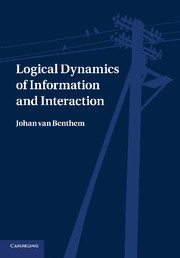Book contents
- Frontmatter
- Contents
- Preface
- Acknowledgments
- 1 Logical dynamics, agency, and intelligent interaction
- 2 Epistemic logic and semantic information
- 3 Dynamic logic of public observation
- 4 Multi-agent dynamic-epistemic logic
- 5 Dynamics of inference and awareness
- 6 Questions and issue management
- 7 Soft information, correction, and belief change
- 8 An encounter with probability
- 9 Preference statics and dynamics
- 10 Decisions, actions, and games
- 11 Processes over time
- 12 Epistemic group structure and collective agency
- 13 Logical dynamics in philosophy
- 14 Computation as conversation
- 15 Rational dynamics in game theory
- 16 Meeting cognitive realities
- 17 Conclusion
- References
- Index
14 - Computation as conversation
Published online by Cambridge University Press: 07 October 2011
- Frontmatter
- Contents
- Preface
- Acknowledgments
- 1 Logical dynamics, agency, and intelligent interaction
- 2 Epistemic logic and semantic information
- 3 Dynamic logic of public observation
- 4 Multi-agent dynamic-epistemic logic
- 5 Dynamics of inference and awareness
- 6 Questions and issue management
- 7 Soft information, correction, and belief change
- 8 An encounter with probability
- 9 Preference statics and dynamics
- 10 Decisions, actions, and games
- 11 Processes over time
- 12 Epistemic group structure and collective agency
- 13 Logical dynamics in philosophy
- 14 Computation as conversation
- 15 Rational dynamics in game theory
- 16 Meeting cognitive realities
- 17 Conclusion
- References
- Index
Summary
The analysis of information and interactive agency in this book crucially involved ideas from computer science. Conversation and games are processes with stepwise changes of information states. And even without a computer around – only hearts and minds – these updates resemble acts of computation: sequential for individuals, and parallel for groups. Conversation as computation turned out a fruitful metaphor – and we recall some illustrations below. But ideas also flow the other way. One can take the logical dynamics stance to computer science, inverting the metaphor to computation is conversation. We illustrate the latter direction, too, ‘epistemizing’ and ‘gamifying’ various algorithmic tasks. This fits with how modern computer systems have moved away from single physical devices to societies of agents engaged in a wide variety of tasks. Thus, in the end, our two directions belong together. Humans and machines mix naturally in logical theory, witness the dynamics of email users in Chapter 4. And joint agency by humans and machines is also a cognitive reality in practice, as we will emphasize in Chapter 16.
- Type
- Chapter
- Information
- Logical Dynamics of Information and Interaction , pp. 303 - 312Publisher: Cambridge University PressPrint publication year: 2011



